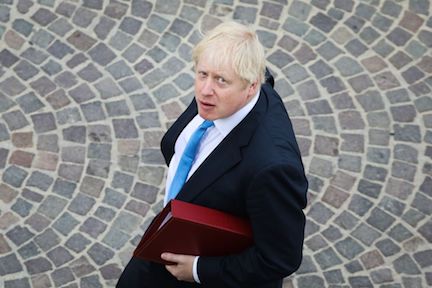Johnson presses on with Brexit law-break plan after Lords defeat
The U.K.’s House of Lords rejected government plans to break international law over Brexit, putting the onus back on Prime Minister Boris Johnson, who immediately vowed to push ahead with the legislation.
Peers voted late Monday to remove the most controversial parts of the Internal Market Bill, which gives ministers the power to unilaterally rewrite parts of the Withdrawal Agreement that Johnson signed with the European Union.
The legislation has prompted the EU to take legal action just as the two sides are locked in negotiations to strike a trade and security deal. But the prime minister has refused to back down over the plan, which the government has conceded will break international law in a “specific and limited” way.

“How can we reproach other countries—Russia, China, Iran—if their behavior becomes reprehensible when we ourselves have such scant regard for the treaties we sign up to?” Michael Howard, who used to lead Johnson’s Conservative Party, asked the Lords. “What sort of a precedent is the government setting?”
Peers voted by 433 to 165 and then by 407 to 148 to remove clauses that would allow ministers to redraw parts of the Withdrawal Agreement.
Johnson’s office immediately issued a statement saying the clauses provide “a legal safety net to protect the integrity of the U.K.’s internal market” and they will be reinstated when the draft law returns to the House of Commons. The unelected upper house can only delay the legislation, not block it.
The bill would give ministers the power, if no trade accord is reached, to waive tariffs on goods traveling from the mainland to Northern Ireland, something that would upset the delicate compromise Britain and the EU reached during the negotiations to leave the bloc.
Johnson agreed then to levy tariffs on goods moving into Northern Ireland that were at risk of being moved south and into the EU as the price for avoiding customs checks on the border with the republic.
“We expect the House of Lords to recognize that we have an obligation to the people of Northern Ireland to make sure they continue to have unfettered access to the U.K. under all circumstances,” Johnson’s office said in the statement.
Cabinet Office Minister Nicholas True had earlier defended the bill and insisted the clauses were necessary and appropriate.
“The rule of law is a fundamental element in our constitution, but so is the principle of Parliamentary sovereignty,” True told the House of Lords. “It is permitted for any government in pursuit of the national interest to ask Parliament to legislate to authorize its acting in a manner that would be lawful in domestic law even if unlawful in international law.”
Similar Stories
United States and Norway issue innovative report creating greater transparency in critical mineral supply chains
Today, the U.S. Department of Commerce and the Norwegian Ministry of Trade, Industry, and Fisheries issued a thorough, innovative report presenting our shared understanding of non-market policies and practices (NMPPs)…
View ArticleDecember CNBC/NRF retail monitor results show strong growth boosted by final Thanksgiving weekend days
Retail sales jumped strongly in December, boosted in part by two busy holiday shopping days during Thanksgiving weekend falling in the final month of the year, according to the CNBC/NRF…
View ArticleNAW presents Dirk Van Dongen Lifetime Achievement Award to Bergman, CEO of Henry Schein, Inc.
At the 2025 NAW Executive Summit Gala on January 28 in Washington, D.C.
View Article
St. Louis region’s chemical industry welcomes new investment
View Article
Navigating compliance: Adapting to changing Customs regulations in global supply chains
View Article
December 2024 U.S. Transportation Sector Unemployment (4.3%) Was the Same As the December 2023 Level (4.3%) And Above the Pre-Pandemic December 2019 Level (2.8%)
View ArticleGet the most up-to-date trending news!
SubscribeIndustry updates and weekly newsletter direct to your inbox!





